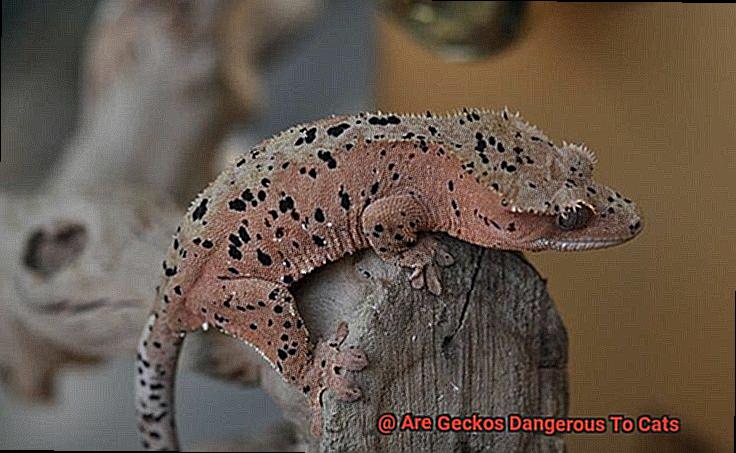Welcome to the captivating world of cats and geckos. As a cat owner, you’re always on the lookout for potential threats to your furry friend’s safety. One such creature that has sparked controversy is the humble gecko.
These spunky little lizards are known for their unique features, like their ability to climb walls and their distinctive chirping sounds. They’re fascinating to watch, but when they come into contact with your cat, things can quickly take a turn for the worse. So, are geckos dangerous to cats?
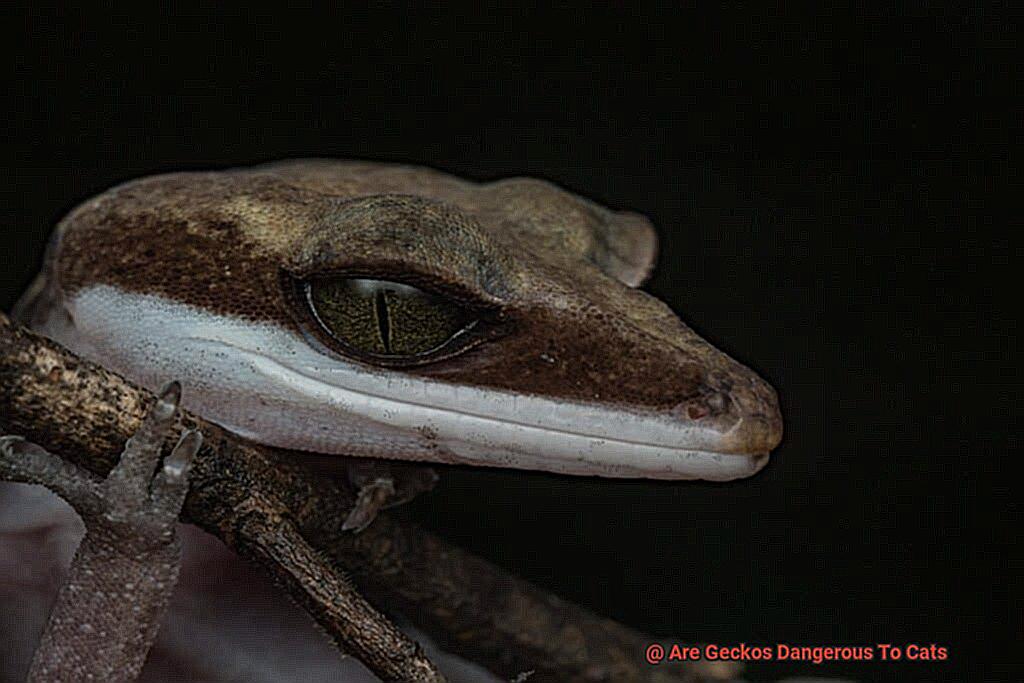
In this blog post, we’ll put this debate to rest once and for all. We’ll explore the different types of geckos that exist out there, why cats are attracted to them, common gecko habitats, and the effects they can have on your cat’s health. Plus, we’ll delve into intriguing cat and gecko behaviors that may surprise you.
So, let’s get started.
What Are Geckos?
Contents
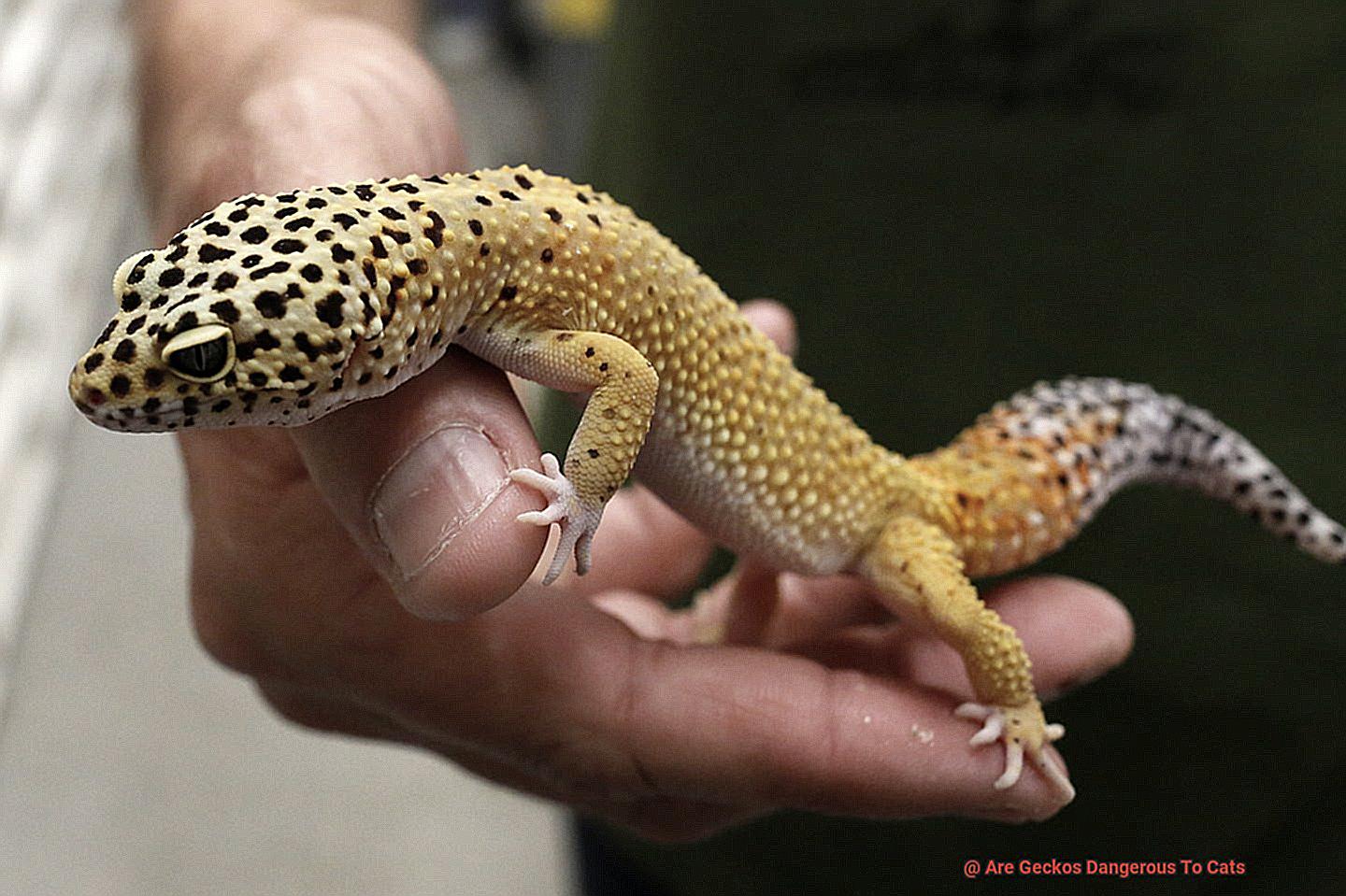
Geckos are some of the most fascinating creatures on the planet. These small lizards have a unique talent for scaling walls and ceilings with their specialized toe pads. With a variety of sizes, colors, and patterns, geckos make for an intriguing addition to any pet collection.
The world is home to over 1,500 different species of geckos, with some being more popular as pets than others. The most commonly kept pet gecko species include leopard geckos, crested geckos, and African fat-tailed geckos. These creatures are typically harmless, but there are some potential risks associated with having them around cats.
Although geckos do not pose a direct threat to cats, they can carry diseases like salmonella and parasites that could harm both cats and humans. Cats may also view geckos as prey and try to catch and eat them, which can result in the cat becoming ill if the gecko carries any dangerous bacteria or parasites.
To minimize any potential risks, pet owners should take precautions when keeping geckos around cats. Regular cleaning of the area where the gecko is kept can help reduce the risk of disease transmission. Additionally, it is essential to supervise interactions between cats and geckos to ensure that feline companions do not accidentally ingest these small lizards.
Geckos are fascinating creatures that can make great pets. While they are generally harmless to cats, it is crucial for pet owners to be aware of the potential risks associated with having them around.
Are Geckos Dangerous to Cats?
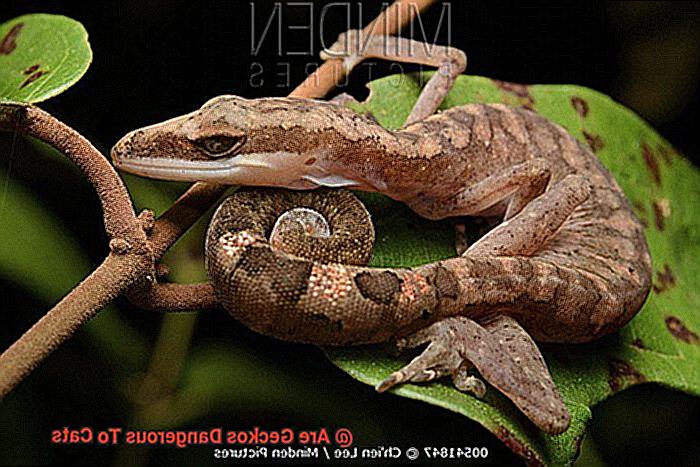
It’s not uncommon for cats to chase after small animals, including geckos. But are geckos dangerous to cats? The answer is yes, and here’s why.
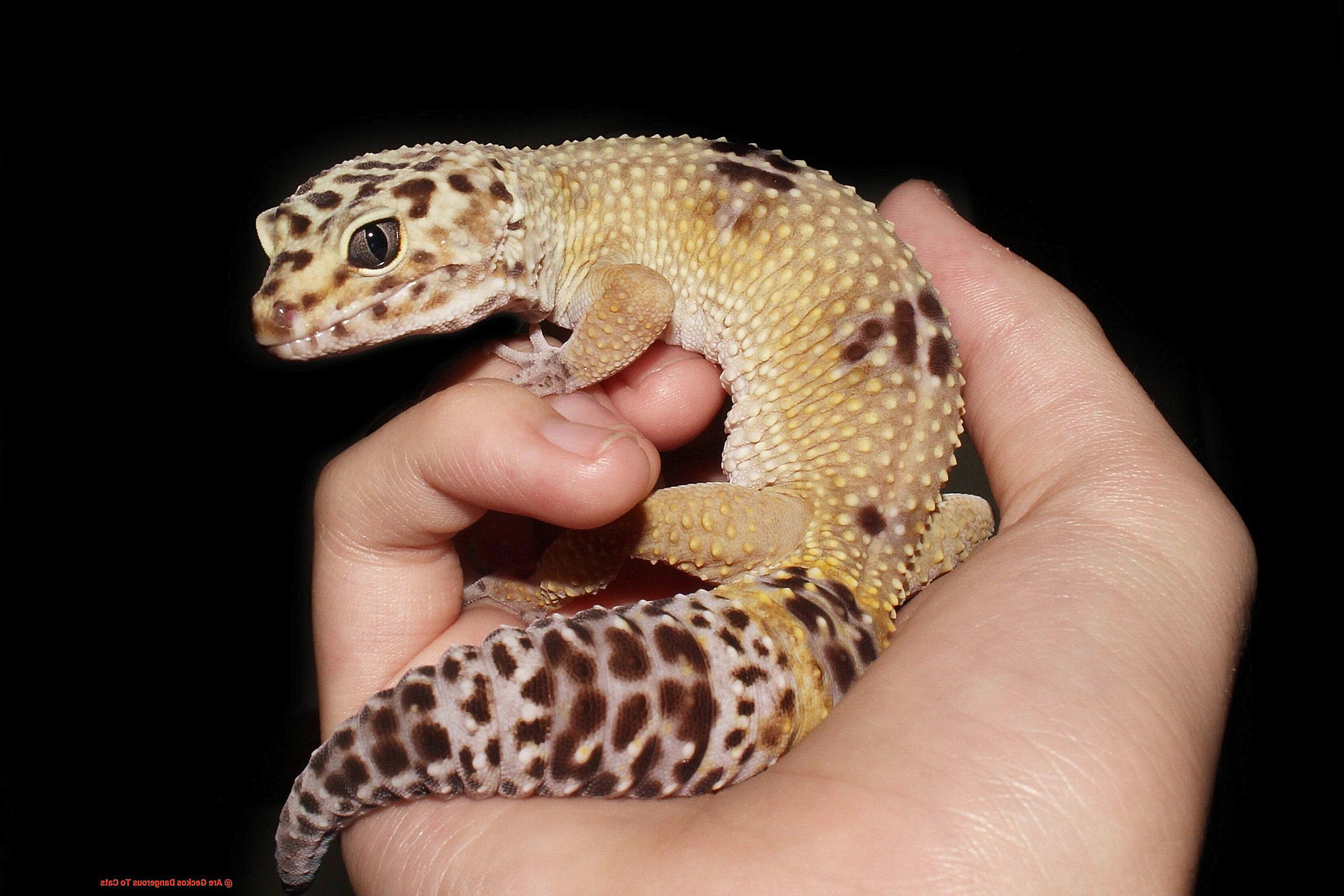
Geckos can scratch or bite cats, causing wounds that can lead to infections if left untreated. And some geckos have sharp claws that can cause damage to a cat’s eyes or other sensitive areas. So, it’s important to monitor your cat’s interactions with geckos and seek medical attention if they sustain any injuries.
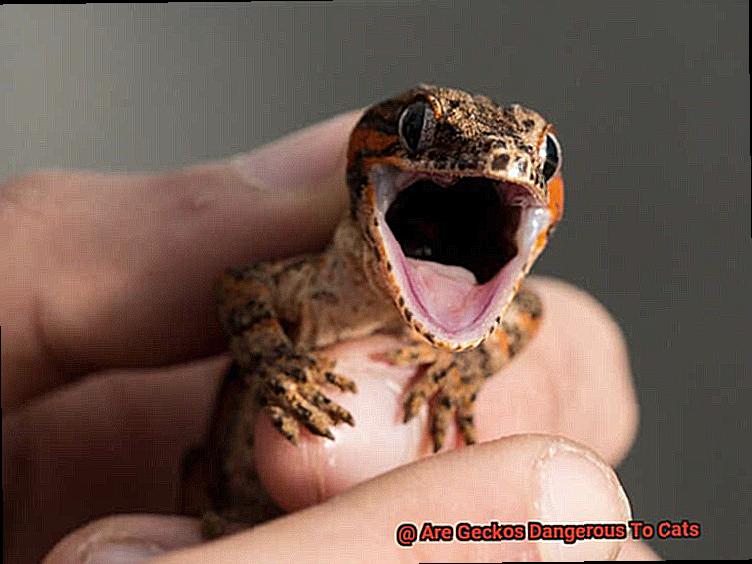
But that’s not all. Geckos may also carry diseases or parasites that can affect both cats and humans. Salmonella, a bacteria commonly found in geckos, can cause severe illness in cats and humans alike. And geckos may also carry ticks or fleas that can transmit other diseases to cats.
Furthermore, some species of geckos can release a toxic substance as a defense mechanism when threatened. If ingested, this substance can cause vomiting, irritation, or even death in cats. So, it’s crucial to keep geckos out of reach of cats and ensure they do not ingest them.
Lastly, geckos are not a natural part of a cat’s diet. Eating geckos can lead to digestive problems or blockages, which can be fatal if not treated promptly. Therefore, it’s important to supervise your cat’s diet and prevent them from eating any non-food items.
While geckos may seem harmless at first glance, they can pose several dangers to cats. As a responsible pet owner, it’s essential to be aware of these risks and take appropriate measures to protect your furry friend from potential harm.
Risks of Geckos to Cats
While geckos are generally considered to be harmless to cats, there are still some risks associated with their presence.
One of the biggest risks of geckos to cats is the possibility of disease transmission. Geckos can carry diseases like salmonella bacteria, which can cause gastrointestinal problems in cats if they come into contact with it. It’s crucial to be aware of this risk and ensure that your cat is not exposed to any potential sources of infection.
Another risk is the potential for cats to ingest geckos. While geckos are generally not toxic, consuming them in large quantities may cause digestive issues or blockages. Additionally, some species of geckos have sharp teeth and claws that can cause injury to a cat if they feel threatened and try to defend themselves.
Geckos can also carry parasites like mites and ticks, which can then be passed on to cats through contact. These parasites can cause skin irritations and other health problems in cats if left untreated. Therefore, it’s important to regularly check both pets for any signs of infestation and take necessary measures to prevent them from occurring.
It’s vital to monitor your furry friend’s interactions with geckos and take necessary precautions to keep them safe. This may involve keeping geckos out of reach of cats or creating separate areas for them to inhabit.
Diseases and Parasites Carried by Geckos
Although it may seem harmless for your cat to play with these reptiles, it’s important to know that geckos can carry diseases and parasites that can be harmful to your furry companion.
One of the most common diseases that geckos carry is salmonella, a type of bacteria that can cause severe gastrointestinal problems in cats. This dangerous pathogen is usually transmitted through contact with gecko feces or contaminated surfaces. Another disease that geckos can carry is cryptosporidiosis, which can result in severe diarrhea and dehydration in cats if ingested.
In addition to diseases, geckos also carry various types of mites and ticks that can attach to cats and cause skin irritation and itching. These pesky parasites can even transmit other diseases such as Lyme disease and Rocky Mountain spotted fever.
It’s important to note that geckos can also pose a physical threat to cats. Cats may try to catch geckos, which can lead to injuries from bites or scratches. Geckos also have the ability to detach their tails as a defense mechanism, which can startle or frighten cats.
To prevent potential health risks for your cat, it’s crucial to monitor their interactions with geckos and take necessary precautions. This includes keeping your home clean and free of gecko feces or contaminated surfaces, as well as preventing your cat from ingesting any gecko prey or carcasses. Regularly checking your cat for any signs of skin irritation or parasites if they have come into contact with a gecko is also essential.
Although geckos may seem harmless, they can carry a variety of diseases and parasites that can be harmful to cats. As a responsible pet owner, it’s important to take necessary precautions and monitor your furry friend’s interactions with these fascinating reptiles to ensure their health and safety.
Potential Ingestion of Geckos by Cats
However, when it comes to geckos, it’s important to understand the potential dangers they pose to your beloved pet. Geckos are small and nimble creatures that can easily find their way into your home or yard, becoming an irresistible prey for cats.
While geckos themselves are not inherently toxic or poisonous, they can carry diseases and parasites that can make your cat seriously ill if ingested. The act of consumption alone can cause choking or blockages in your cat’s digestive system, leading to severe health complications.
It’s crucial to keep a close eye on your cat if you suspect they may have eaten a gecko. Be on the lookout for warning signs such as vomiting, diarrhea, loss of appetite, lethargy, and abdominal pain. These symptoms may indicate that your cat is suffering from digestive issues related to the ingestion of the gecko.
In severe cases, the ingestion of a gecko can even lead to life-threatening conditions like intestinal perforation. That’s why it’s essential to take proactive measures to prevent your cat from hunting or consuming geckos in the first place.
One of the most effective ways to do this is by keeping your cat indoors. Additionally, providing them with plenty of toys and activities can help alleviate boredom and prevent them from seeking out prey. If you have geckos or other small animals in your yard, make sure they are safely contained or removed from the area.
Preventing Risks and Health Issues for Cats
That’s why it’s essential to be aware of the potential risks and health issues that geckos can pose to cats. While these small reptiles may seem harmless, they can carry diseases and parasites that can be transmitted to your cat through contact or ingestion.
One of the primary concerns with geckos is salmonella, a bacteria commonly found in their droppings. This bacteria can wreak havoc on your cat’s digestive system, leading to vomiting, diarrhea, and dehydration. Additionally, geckos may also carry parasites such as mites and ticks, which can cause skin irritations and infections.
To prevent these risks and health issues, it’s crucial to keep your cat away from geckos as much as possible. Whether that means keeping your cat indoors or closely monitoring them when they’re outside, it’s worth taking the extra precautions. If you do have geckos in your home, make sure to clean up their droppings regularly and keep their habitats clean to reduce the risk of bacterial contamination.
In addition to preventative measures like keeping your cat away from geckos, there are other steps you can take to safeguard your furry friend’s health.
Using products such as flea and tick preventatives can protect your cat from parasites that may be carried by geckos or other outdoor animals.
Regular check-ups with your veterinarian can also help detect any potential health issues early on.
Conclusion
In conclusion, the question of whether geckos pose a threat to cats has been answered. Although geckos themselves are not inherently dangerous to feline friends, they can carry diseases and parasites that can harm both cats and humans. Additionally, cats may view geckos as prey, which could lead to injuries or ingestion of harmful substances.
As a responsible pet owner, it’s crucial to take measures to protect your cat when keeping geckos around. Regular cleaning of the area where the gecko is kept can help reduce the risk of disease transmission. It’s also important to supervise interactions between cats and geckos closely, ensuring that your cat doesn’t accidentally ingest these small lizards.
Moreover, it’s vital to monitor your cat for any signs of illness or injury if they’ve come into contact with a gecko. If necessary, seek medical attention promptly and take proactive steps to prevent your cat from hunting or consuming geckos in the first place.
In summary, by being aware of the potential risks associated with keeping cats and geckos together and taking necessary precautions, you can ensure that your furry friend remains safe and healthy while still enjoying the fascinating world of these captivating creatures.

